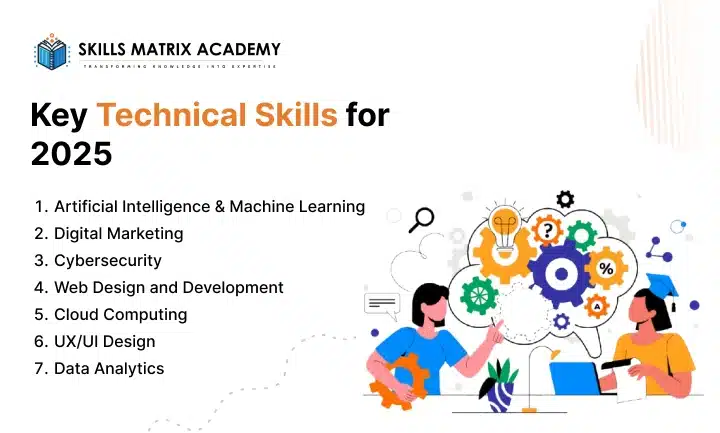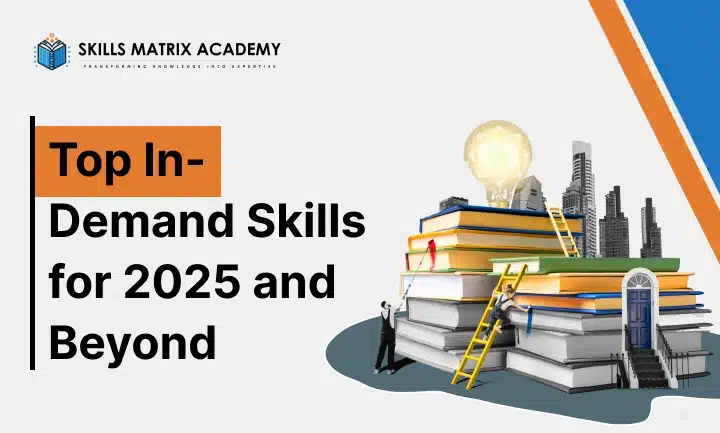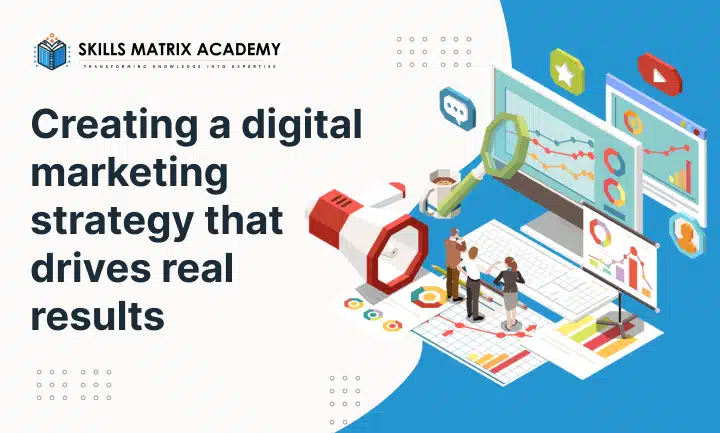In today’s global age, technology is advancing faster than ever before. Every year, we see the latest tools and advancements reshape how we live and work.
For professionals, this creates both opportunities and challenges. To stay competitive, it’s no longer enough to just rely on old knowledge. You must be aware of future skills that can boost employees’ competitiveness and help you stand out.
Companies are now focusing on hiring based on skills. This creates a growing need to use new technologies effectively. This shift brings us to a critical question:
What Are Skills?

Before diving into the future, let’s define the basics.
Skill is the ability to apply knowledge and produce something valuable. It’s not just knowing something—it’s about using it to solve problems or create value for people.
A skill means being able to do something well. To develop it, you need the right knowledge, practice, and real-world application.
In simple terms: knowledge alone isn’t enough. It’s the action and results that make knowledge a skill.The good news? You can always upskill and adapt to changing times. There are three main ways:
1. Education
Education gives you the foundation. It usually comes from a school, college, or technical institute. For example, platforms like Skills matrix academy provide structured courses in areas like Digital Marketing, Web Design and Development, and UX/UI Design.
Education is often more theory-based learning, focusing on principles and concepts. This helps you understand the “why” behind a subject.
2. Training
Training is hands-on learning. It focuses on doing, not just knowing.
It’s hands-on learning where you gain confidence by applying skills repeatedly. Think coding bootcamps, digital marketing workshops, or guided design labs in UX/UI.
3. Experience
Experience combines learning and practice. It’s applying what you know in real life.
This is where the actual transformation happens. When you deal with real projects, you learn how to adapt, solve problems, and grow. Over time, your skill set becomes stronger.
Top In-Demand Skills in India for 2025
To succeed in today’s job market, you need a strong mix of technical skills and soft skills.
- Technical skills allow you to work effectively with new tools and technology.
- Soft skills help you adapt to change, communicate well, and solve problems.
Both are important for long-term career growth and success.
Key Technical Skills for 2025

AI, automation, and technology changes are transforming the workplace. Professionals who develop the right skills will stand out.
The most in-demand technical skills in India for 2025 include:
1. Data Analytics
Data analytics is about turning raw information into meaningful insights. Businesses use it to improve strategies and make smarter decisions.
Tools to learn: Excel, SQL, Tableau, Python, R.
Learning path: Take a course, practice real projects, and build a portfolio.
Career options:
- Data Analyst
- Business Intelligence Analyst
- Market Research Analyst
Skills gained: Data interpretation, visualization, and storytelling with data.
Example: A retailer can use data analytics to track customer behaviour and design better marketing campaigns.
2. Artificial Intelligence & Machine Learning
AI and ML are reshaping industries. They help automate tasks, improve efficiency, and solve complex problems.
Skills to learn: Python, TensorFlow, PyTorch, NLP, data visualization.
Learning path: Learn theory, build projects, and work with real datasets.
Career options:
- AI Engineer
- Machine Learning Specialist
- Robotics Engineer
Skills gained: Deep learning, NLP, computer vision, neural networks.
Example: AI can be used in healthcare for faster disease diagnosis or in finance for fraud detection.
3. Digital Marketing
Digital marketing is about creating visibility and growth for businesses online. It combines creativity, analytics, and strategy.
Skills to learn: SEO, social media marketing, content marketing, PPC, email campaigns.
Learning path: Learn practical techniques and use real tools like Google Analytics.
Career options:
- SEO Analyst
- Social Media Manager
- Content Strategist
Skills gained: SEO, paid ads, content creation, email automation, analytics.
Example: A brand can use SEO and social media campaigns to increase website traffic and sales.
4. Cybersecurity
Cybersecurity protects data, systems, and networks from digital threats. It is now a core need for all businesses.
Skills to learn: Threat detection, secure system design, risk management, privacy protection.
Learning path: Learn the basics and get certifications to build credibility.
Career options:
- Cybersecurity Analyst
- Ethical Hacker
- Security Manager
Skills gained: Network security, risk analysis, penetration testing.
Example: Cybersecurity specialists help protect customer data for banking and e-commerce companies.
5. Web Design and Development
Web design and development is more than coding. It blends technical skills with creativity and strategy.
Skills to learn: HTML, CSS, JavaScript, frameworks, backend technologies.
Learning path: Build websites, work on real projects, and focus on responsive design.
Career options:
- Web Designer
- Front-End Developer
- Full-Stack Developer
- UI/UX Designer
Skills gained: Responsive design, coding, SEO-friendly websites, database management.
Example: A developer can create an e-commerce site that is both visually appealing and fast-loading.
6. Cloud Computing
Cloud computing allows businesses to scale quickly and work efficiently. Demand for cloud expertise is growing fast.
Skills to learn: AWS, Azure, Google Cloud, Docker, Kubernetes.
Learning path: Learn platforms, deploy projects, and practice cloud security.
Career options:
- Cloud Architect
- Cloud Engineer
- DevOps Engineer
Skills gained: Cloud deployment, security, containerization, virtualization.
Example: Cloud computing helps startups quickly launch apps without investing in servers.
7. UX/UI Design
UX/UI design focuses on creating smooth and engaging experiences for users. Good design improves usability and loyalty.
Skills to learn: Wireframing, prototyping, usability testing, Figma, Adobe XD, Sketch.
Learning path: Learn design principles, work on projects, and test designs.
Career options:
- UX Designer
- UI Designer
- Product Designer
Skills gained: User research, persona creation, prototyping, usability testing.
Example: UX designers help make a banking app simple and secure for customers.
In-Demand Soft Skills for Career Growth

Soft skills are essential for success. They help you:
Work well with others
Adapt to change
Lead confidently
Today, companies value diversity, teamwork, and creativity. That’s why soft skills matter as much as technical skills. Whether you work in Digital Marketing, Web Design and Development, UX/UI Design, or another field, these skills set you apart.
Here are the top soft skills for 2025 and beyond.
1. Emotional Intelligence & Leadership
Understanding your feelings and the feelings of others. It includes empathy, self-awareness, and communication.
Why it matters: Leaders with emotional intelligence build trust, solve conflicts, and inspire teams. They motivate, guide, and create positive workplaces.
Key skills:
- Emotional awareness
- Conflict resolution
- Decision-making
- Clear communication
Careers: Team Leader, Project Manager, HR Manager, Customer Relationship Manager
Example: In Web Design and Development, emotional intelligence helps teams work smoothly when projects change.
2. Problem-Solving & Critical Thinking
Breaking problems into smaller parts and finding practical solutions.
Why it matters: It helps you make better decisions and improves efficiency.
Key skills:
- Logical thinking
- Communication
- Strategic planning
Careers: Business Analyst, Project Manager, Software Engineer, Research Professional, Team Leader.
Example: In Digital Marketing, these skills help improve campaigns when results are low
3. Adaptability & Resilience
Adjusting to changes and staying productive under pressure.
Why it matters: Work is changing fast with AI, automation, and remote work. These skills help you keep up.
Key skills:
- Change management
- Growth mindset
- Stress handling
- Quick decision-making
- Learning new skills
Careers: HR Professional, Project Manager, Customer Service Manager, Sales Expert, Entrepreneur
Example: In UX/UI Design, adaptability helps designers change strategies without losing quality.
4. Creativity & Proactivity
Creativity = new ideas. Proactivity = taking action early.
Why it matters: They drive innovation and solve problems before they grow.
Key skills:
- Innovation
- Problem-solving
- Audience understanding
- Prototyping
Careers: Web Designer, Content Creator, Website Developer, Business Owner, Digital Marketer
Example: In Digital Marketing, creativity makes campaigns stand out. In UX/UI Design, it improves user experience.
Conclusion
One of the most valuable things you can do for your career is to upskill yourself. In 2025, the job market will favour those who can adapt to changes and keep up with the latest trends.
Choosing Skills matrix academy means choosing to master in-demand skills that matter. Our professional courses deliver both practical information and hands-on experience. This ensures you gain real-world skills that employers value.
Start your learning journey with the Skills matrix to secure your future in a changing work environment.
Invest in learning today to thrive tomorrow.
FAQs on The Most Demanding Skills
1. What are the most demanding skills for the future?
The future job market needs skills like Data Science, Data Analytics, Business Intelligence, Web Design and Development, Digital Marketing, Artificial Intelligence (AI), Machine Learning (ML), UX/UI Design, Cybersecurity, Programming Languages, and Cloud Computing. These are crucial for career success.
2. Can I learn high-demand skills online?
Yes. You can learn high-demand skills online through short courses, certifications, or boot camps. Online learning is flexible, allowing you to study at your own pace. This works well for skills such as Digital Marketing, Web Design and Development, and UX/UI Design.
3. Why are soft skills important in 2025?
By 2025, soft skills like teamwork, leadership, and adaptability will be essential. They help professionals thrive in technology-driven workplaces and handle challenges effectively.
4. How can professionals acquire these skills?
Professionals can develop skills through online courses, certificates, boot camps, projects, and internships. This hands-on approach builds expertise in Digital Marketing, Web Design and Development, and UX/UI Design.









